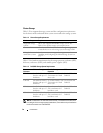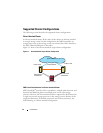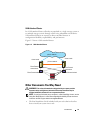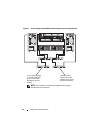
8 Introduction
Cluster Solution
Your cluster implements a minimum of two nodes to a maximum of either
eight nodes (for Windows Server 2003) or sixteen nodes (for Windows Server
2008) and provides the following features:
• 8-Gbps and 4-Gbps Fibre Channel technology
• High availability of resources to network clients
• Redundant paths to the shared storage
• Failure recovery for applications and services
• Flexible maintenance capabilities, allowing you to repair, maintain, or
upgrade a node or storage system without taking the entire cluster offline
Implementing Fibre Channel technology in a cluster provides the following
advantages:
•
Flexibility
— Fibre Channel allows a distance of up to 10 km between
switches without degrading the signal.
•
Availability
— Fibre Channel components use redundant connections
providing multiple data paths and greater availability for clients.
•
Connectivity
— Fibre Channel allows more device connections than
Small Computer System Interface (SCSI). Because Fibre Channel devices
are hot-pluggable, you can add or remove devices from the nodes without
taking the entire cluster offline.
Cluster Hardware Requirements
Your cluster requires the following hardware components:
• Cluster nodes
• Cluster storage


















